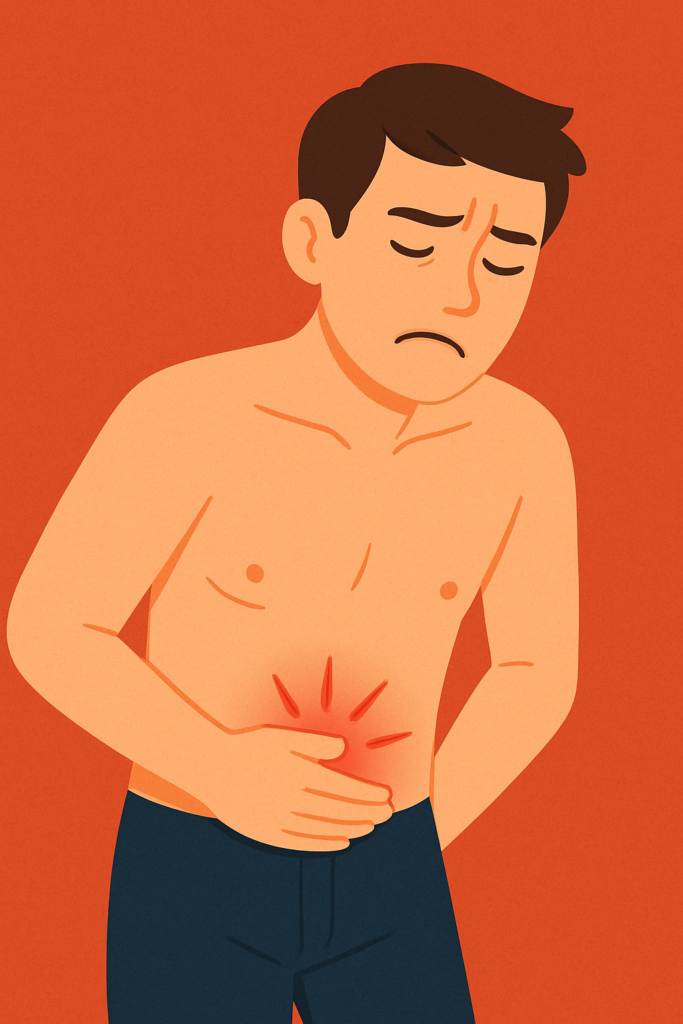Appendicitis is a common yet potentially serious medical condition that occurs when the appendix becomes inflamed and filled with pus. It affects people of all ages, but it’s most common in individuals between the ages of 10 and 30. Early diagnosis and treatment are crucial to prevent complications such as a ruptured appendix.
What Is Appendicitis?
The appendix is a small, tube-like structure attached to the large intestine, located in the lower right side of the abdomen. The appendix is a storehouse of beneficial bacteria that help break down indigestible foods, such as cheese, white flour foods, red meat, and chocolate. It can become blocked when gut peristalsis slows down, potentially leading to infections. When this happens, bacteria can proliferate inside it, leading to inflammation and disease—this condition is known as appendicitis.
Symptoms of Appendicitis

Recognising the symptoms of appendicitis early can make a significant difference in treatment outcomes. Common signs include:
- Sudden pain around the navel that shifts to the lower right abdomen
- Pain that worsens with movement, coughing, or sneezing
- Nausea and vomiting
- Loss of appetite
- Low-grade fever
- Constipation or diarrhoea
- Abdominal bloating
If you or someone you know experiences these symptoms, it is essential to seek medical attention immediately.
Causes and Risk Factors
While the exact cause of appendicitis can vary, common triggers include:
- Causes –
- Habitual eating without hunger
- Eating fatty foods such as cheese and cottage cheese, butter, and frequent consumption of red meat.
- Eating late at night
- Blockage in the appendix by feces, a foreign object, or even a tumor
- Infection in the digestive tract, which can cause the tissue of the appendix to swell
- Inflammatory bowel diseases like Crohn’s disease
Though appendicitis can affect anyone, some factors may increase your risk, such as a family history of the condition or being male and between the ages of 10 and 30.
Can Appendicitis Be Prevented?
Appendicitis can be prevented by maintaining a healthy lifestyle and food choices.
1. Eat right
Populations that consume diets when hungry have lower rates of appendicitis. This means that people who eat foods that are proportionate to their work and lifestyle live healthier lives. People who eat non-vegetarian foods often engage in strenuous physical labour, while those who eat fruits and vegetables tend to have more active lifestyles. Fear also causes the bowels to be arrested.
2. Stay Hydrated
Drinking adequate amounts of water aids digestion and supports bowel health. It also helps in preventing constipation, a possible trigger for appendicitis.
3. Regular Physical Activity
Exercise supports good digestion and overall gut health, which may contribute to reducing the risk of gastrointestinal infections and blockages.
4. Avoid Processed Foods
Highly processed foods low in fibre and high in sugar and unhealthy fats may contribute to poor gut health and increase the risk of various digestive issues, including appendicitis.
Appendicitis is a medical emergency that requires prompt treatment, usually involving surgical removal of the appendix (appendectomy). It can be prevented by making healthy lifestyle choices, particularly in terms of diet and hydration.
Receive regular checks through Nadi Pariksha, which can lead to an early diagnosis and better outcomes.
Stay healthy, stay informed!



